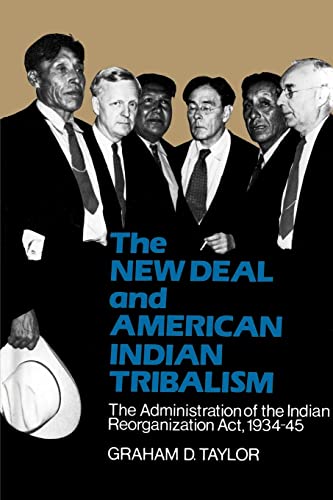The New Deal and American Indian Tribalism
The Administration of the Indian Reorganization Act, 1934-45
Graham D. Taylor
BOOK REVIEW

In the swirling maelstrom of American history, few periods have been as transformational-or as contentious-as the era of the New Deal, particularly when viewed through the lens of Indigenous rights and identity. The New Deal and American Indian Tribalism: The Administration of the Indian Reorganization Act, 1934-45 by Graham D. Taylor embarks on a riveting exploration of this intersection. This book isn't just a scholarly examination; it's a clarion call to understand the intricate dance between governmental policy and tribal sovereignty that reshaped the lives of American Indians during a pivotal decade.
Taylor guides us through the labyrinth of the Indian Reorganization Act (IRA), a legislative effort aimed at reversing the assimilation policies of the previous decades. The IRA was not merely a bureaucratic initiative; it was a complex tapestry woven with threads of hope and tension, ambition and betrayal. The author's meticulous research reveals a stirring narrative where the government oscillated between paternalism and empowerment. He deftly illustrates how tribal leaders seized this moment, navigating an often hostile political landscape to assert their rights, cultural identity, and self-determination.
Readers are thrust into the heart of this struggle, feeling the pulse of tribal nations grappling for agency amidst a broader societal transformation. The stakes could not have been higher. Taylor eloquently emphasizes the very real human costs of policy decisions made in distant offices, making it impossible to ignore the voices of those who lived them. They are not abstract statistics; they are stories of struggle and resilience, compelling enough to evoke not just empathy but a deep-seated anger at the injustices faced.
Critics have found Taylor's analysis compelling, noting his ability to balance historical context with personal narratives. Yet, there are dissenting voices. Some argue that he doesn't delve deeply enough into the long-term impacts of the IRA, viewing it as a temporary fix rather than a genuine solution. This tension-between optimism and cynicism-creates a dichotomy that reverberates throughout the book. It's not just a historical recounting; it's a conversation that challenges readers to confront the legacies of past actions and their ongoing repercussions today.
The 203 pages pulse with urgency as Taylor unearths the frictions within tribal governments themselves. The clash of modernity versus tradition forms a dramatic backdrop-what does it mean to be a 'tribe' in a rapidly changing America? The IRA may have offered a lifeline, but it also imposed structures and definitions that some saw as intrusive. Herein lies the brilliance of Taylor's work: he prompts us to reflect on identity itself. Are identities shaped by external governance, or do they arise intrinsically from cultural heritage?
In the present moment, as Indigenous rights continue to be invoked in discussions of social justice and environmental stewardship, this book serves as a crucial reminder of the historical battles fought and the victories won, as well as the ones still in progress. The New Deal and American Indian Tribalism is not just about history; it's a beacon for understanding our current landscape, a clarion call to acknowledge and rectify historical wrongs.
This isn't merely an academic text; it's a passionate plea for recognition, a rallying cry for justice. Taylor's exploration will linger in your thoughts long after you've turned the last page-an emotional testament to the resilience of those who refuse to be erased from history. Dive into its depths, and you'll emerge transformed, illuminated by the complexity of a narrative that challenges you to rethink what you know about America's past and its Indigenous peoples. ✊️
📖 The New Deal and American Indian Tribalism: The Administration of the Indian Reorganization Act, 1934-45
✍ by Graham D. Taylor
🧾 203 pages
1980
#deal #american #indian #tribalism #administration #indian #reorganization #act #1934 #graham #taylor #GrahamDTaylor